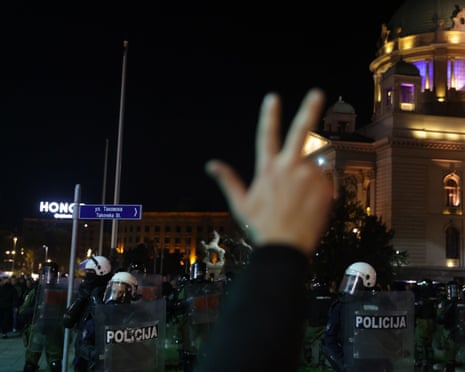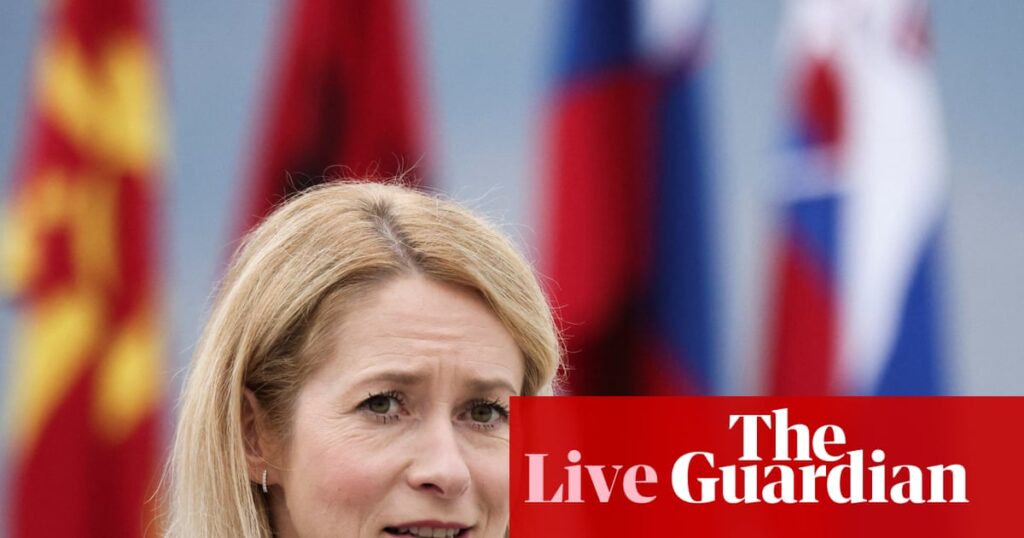Morning opening: The marking process
Jakub Krupa
The European Union is set to reveal its ratings for candidate countries later today, assessing the progress they are making on the path to become the union’s members in the future.
We will hear from the EU’s foreign policy chief, Kaja Kallas, and the enlargement commissioner, Marta Kos, early afternoon.
Lots of potential lines to look out for there, as we will get the commission’s assessment of the worsening situation in Georgia, the attempts to reform Ukraine despite the on-going Russian aggression, and their look at the western Balkan countries, including Serbia, which sees continued protests against Aleksandar Vučić’s rule.

Separately, I will keep an eye on the EU defence commissioner Andrius Kubilius’s meeting with Nato’s secretary general Mark Rutte in Brussels on rearming Europe.
There is also more news from the Netherlands, the Czech Republic, Germany, and others.
Lots for us to go through.
It’s Tuesday, 4 November 2025, it’s Jakub Krupa here, and this is Europe Live.
Good morning.
Key events
Worker dies after being rescued from partially collapsed medieval tower in Rome

Angela Giuffrida
in Rome
Separately, a Romanian worker who was trapped for hours under rubble in Rome after the partial collapse of a medieval tower has died in hospital, just a short time after he was pulled free by emergency services.
“I express deep sorrow and condolences, on behalf of myself and the government, for the tragic loss of Octay Stroici, the worker who was killed in the collapse of the Torre dei Conti in Rome,” Italy’s prime minister Giorgia Meloni said in a statement after midnight. “We are close to his family and colleagues at this time of unspeakable suffering.”
Two section of the 29-metre (95ft) Torre dei Conti, near the Colosseum, crashed to the ground, videos posted on social media showed. The first collapse took place at about 10.30am UK time, the second about 90 minutes later.
Clouds of dust billowed out of the windows, along with the sound of collapsing masonry. The second collapse happened while firefighters worked on the structure with aerial ladders. None of the firefighters were injured.
Authorities said he was conscious during the lengthy rescue operation before he was hospitalised in critical condition. He died shortly after he arrived at the hospital.
Czechs mourn death of Catholic leader Duka
In other news, Czechs are mourning the Catholic archbishop emeritus of Prague, Dominik Duka, who has died overnight at the age of 82.
Cardinal Duka – whose father flew in the British RAF during the second world war – was one of the most influential religious leaders in the Czech Republic, serving as a dissident priest under communism who eventually got imprisoned alongside playwright turned president Václav Havel.
After 1989, he played a pivotal role as the church sought to reinstate itself in the Czech public life, becoming the archbishop of Prague in 2012, and leading the church through a difficult debate about the restitution of property confiscated under communism.
But in recent years he also faced growing criticism over his increasingly outspoken positions on public issues, including Russia, and Muslim immigration, with the Radio Prague’s International service calling him a “a divisive yet defining church leader.”
Outgoing prime minister, Petr Fiala, said he “respected his courage and activity during the time of totalitarianism,” and “appreciated his important role in the renewal of the church in the democratic society.”
Incoming Czech billionaire turned prime minister, Andrej Babiš, also paid tribute to Duka’s service which “for many years helped shape the spiritual and social life of our country.”
Duka’s funeral is planned for 15 November.
EU’s rule of law reports ‘even less comprehensive’ this year, risks ‘backsliding’, campaigners warn
Speaking of the marking process, the civil rights group Liberties has also just published its assessment of the EU commission’s separate annual rule of law report, which looks at the union’s member states and their work in this area.
In a scathing summary, the assessment found that the EU’s analysis “in key areas was even less comprehensive, with key issues neglected and no consequences for non-compliance with recommendations,” with some parts of the report literally “repeated verbatim, regardless of the level of progress, the seriousness of the violation, or the implications of continued inaction” from previous years.
It said that “Hungary stands out as an outlier, holding the highest number of recommendations with persistent ‘no progress’ status, underscoring deep-rooted governance issues and resistance to EU-level oversight.”
But “other countries showing notable stagnation include Italy, Bulgaria, Ireland, and Germany, each with five or six recommendations that remain unaddressed since 2022.”
In total, “the share of recommendations fully implemented fell from 11% in 2023 to 6% in both 2024 and 2025,” it said.
“This indicates that the Annual Rule of Law Report risks becoming a symbolic monitoring exercise rather than a real tool to protect the rule of law and fundamental rights. The main recommendation to tackle persistent non-compliance is to strengthen enforcement mechanisms, including infringement proceedings and budget conditionality, ensuring that they are applied in a regular and timely manner,” Liberties said.
The group warned that “without rapid action, we fear the backsliding will escalate and changes will become very difficult to reverse.”
The report is here.
Morning opening: The marking process

Jakub Krupa
The European Union is set to reveal its ratings for candidate countries later today, assessing the progress they are making on the path to become the union’s members in the future.
We will hear from the EU’s foreign policy chief, Kaja Kallas, and the enlargement commissioner, Marta Kos, early afternoon.
Lots of potential lines to look out for there, as we will get the commission’s assessment of the worsening situation in Georgia, the attempts to reform Ukraine despite the on-going Russian aggression, and their look at the western Balkan countries, including Serbia, which sees continued protests against Aleksandar Vučić’s rule.
Separately, I will keep an eye on the EU defence commissioner Andrius Kubilius’s meeting with Nato’s secretary general Mark Rutte in Brussels on rearming Europe.
There is also more news from the Netherlands, the Czech Republic, Germany, and others.
Lots for us to go through.
It’s Tuesday, 4 November 2025, it’s Jakub Krupa here, and this is Europe Live.
Good morning.

